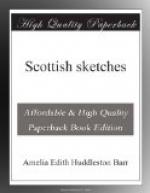His short speech at the final meeting was so frank and manly, and so just and honorable to his uncle, that it roused a quiet but deep enthusiasm. Many of the older men had to wipe the mist from their glasses, and the heaviest creditor stood up and took David’s hand, saying, “Gentlemen, I hae made money, and I hae saved money, and I hae had money left me; but I never made, nor saved, nor got money that gave me such honest pleasure as this siller I hae found in twa honest men’s hearts. Let’s hae in the toddy and drink to the twa Callendars.”
Alas! alas! how often is it our friends from whom we ought to pray to be preserved. The man meant kindly; he was a good man, he was a God-fearing man, and even while he was setting temptation before his poor, weak brother, he was thinking “that money so clean and fair and unexpected should be given to some holy purpose.” But the best of us are the slaves of habit and chronic thoughtlessness. All his life he had signalled every happy event by a libation of toddy; everybody else did the same; and although he knew David’s weakness, he did not think of it in connection with that wisest of all prayers, “Lead us not into temptation.”
CHAPTER VI.
David ought to have left then, but he did not; and when his uncle’s health was given, and the glass of steaming whiskey stood before him, he raised it to his lips and drank. It was easy to drink the second glass and the third, and so on. The men fell into reminiscence and song, and no one knew how many glasses were mixed; and even when they stood at the door they turned back for “a thimbleful o’ raw speerit to keep out the cold,” for it had begun to snow, and there was a chill, wet, east wind.
Then they went; and when their forms were lost in the misty gloom, and even their voices had died away, David turned back to put out the lights, and lock the mill-door for the last time. Suddenly it struck him that he had not seen Robert Leslie for an hour at least, and while he was wondering about it in a vague, drunken way, Robert came out of an inner room, white with scornful anger, and in a most quarrelsome mood.
“You have made a nice fool of yoursel’, David Callendar! Flinging awa so much gude gold for a speech and a glass o’ whiskey! Ugh!”
“You may think so, Robert. The Leslies have always been ’rievers and thievers;’ but the Callendars are of another stock.”
“The Callendars are like ither folk—good and bad, and mostly bad. Money, not honor, rules the warld in these days; and when folk have turned spinners, what is the use o’ talking about honor! Profit is a word more fitting.”
“I count mysel’ no less a Callendar than my great-grandfather, Evan Callendar, who led the last hopeless charge on Culloden. If I am a spinner, I’ll never be the first to smirch the roll o’ my house with debt and dishonesty, if I can help it.”




